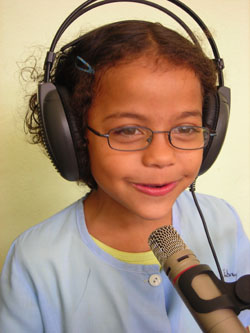You are here » Home » Telling Our Story
Success Story
Interactive radio show educates both pupils and teachers nationwide
Tahina, the Voice of Educational Reform

Photo: EDC/Norma Evans
Tahina Dähn Ralamboarison interprets the role of “Vaviroa” in USAID-supported educational radio programs broadcast nationwide for Grade 1 and 2 pupils.
“I like the radio programs because they are fun, and I like the games you
can play and the songs you can sing,” said Tahina Dähn Ralamboarison.
Tahina Dähn Ralamboarison may only be 3 feet 5 inches tall, and all of 9 years old, but she is already a key player in the Ministry of Education’s plan to improve the quality of primary education.
Tahina was selected from over sixty eager applicants to play the part of “Vaviroa” in interactive radio programs developed for Grades 1 and 2.
The programs, developed with USAID assistance, are part of the Ministry of Education’s commitment to providing the country’s 15,000 community-based teachers with ongoing training in new, student-centered teaching strategies.
Broadcast directly into classrooms three times a week, the programs model how games, manipulatives, stories, songs, and group work can help pupils learn.
Teachers testing the programs are enthusiastic about their quality and their potential to change the face of primary classes nationwide. They are amazed to see their pupils carrying out the new activities proposed, particularly those that require learners to take ownership of the learning process. And teachers appreciate the segment at the end of each program that reviews one of the teaching strategies presented and explains why it is effective for teaching young children. For community-based teachers, who have never had the opportunity to attend teacher’s college, the programs “are the first time anyone has ever talked to [us] about teaching - and in a practical, concrete way that we can easily understand and translate into classroom practice,” said teacher Jeanne Phellycia Rafidiarisoa.
For Tahina, who comes to the Ministry of Education production studio once a week with her friends Diary Andriatiana (who reads the role of “Faly”) and Séphora Rafaliarivelo (“Mendrike”) to record the children’s voices, the programs are just fun. She knows that eventually children all across Madagascar will get to sing along with the songs she is recording, listen to the stories and play the games.
Print-friendly version of this page (533kb - PDF)
Back to Top ^ | 

